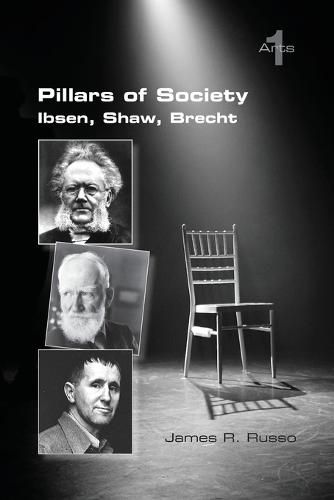Readings Newsletter
Become a Readings Member to make your shopping experience even easier.
Sign in or sign up for free!
You’re not far away from qualifying for FREE standard shipping within Australia
You’ve qualified for FREE standard shipping within Australia
The cart is loading…






This title is printed to order. This book may have been self-published. If so, we cannot guarantee the quality of the content. In the main most books will have gone through the editing process however some may not. We therefore suggest that you be aware of this before ordering this book. If in doubt check either the author or publisher’s details as we are unable to accept any returns unless they are faulty. Please contact us if you have any questions.
Pillars of Society: Ibsen, Shaw, Brecht is a collection of essays on the plays Pillars of Society (1877), Ghosts (1881), A Dolls House (1879), and Hedda Gabler (1890), by Henrik Ibsen; The Philanderer (1893), Candida (1894), The Doctor's Dilemma (1906), Androcles and the Lion (1912), Major Barbara (1905), Misalliance (1910), Saint Joan (1923), and Pygmalion (1913), by George Bernard Shaw; A Man's a Man (1926), Mother Courage and Her Children (1941), The Caucasian Chalk Circle (1945), Life of Galileo (1939), Saint Joan of the Stockyards (1929), The Trial of Joan of Arc at Rouen, 1431 (1934), and The Visions of Simone Machard (1943), by Bertolt Brecht; and on the subjects of tragedy, comedy, realism, theatricalism, feminism, and adaptation. Pillars of Society thus features close analysis of individual plays by Ibsen, Shaw, and Brecht, plus readable, comparative surveys of these writers' dramatic oeuvres and production careers. Shaw wrote about Ibsen's incipient influence on him in The Quintessence of Ibsenism; early in his career, Brecht wrote an essay about Shaw titled "Three Cheers for Shaw." These three modern dramatists are linked, in this way, in their common moral, social, and political concerns, as well as in their bridging of such artistic movements as naturalism, symbolism, epic theater, even absurdism. James R. Russo is an independent researcher who holds graduate degrees, including the doctorate, from the University of Richmond and Louisiana State University. He has taught at those schools as well as Tulane. Russo's primary scholarly interests are the cinema and comparative literature. He has edited or authored the following published books: Film Nation: William Troy on the Cinema, 1933-1935; The Bookman: William Troy on Literature and Criticism, 1927-1950; Drama According to Alexander Bakshy, 1916-1946; and Analyzing Film: A Student Casebook.
$9.00 standard shipping within Australia
FREE standard shipping within Australia for orders over $100.00
Express & International shipping calculated at checkout
This title is printed to order. This book may have been self-published. If so, we cannot guarantee the quality of the content. In the main most books will have gone through the editing process however some may not. We therefore suggest that you be aware of this before ordering this book. If in doubt check either the author or publisher’s details as we are unable to accept any returns unless they are faulty. Please contact us if you have any questions.
Pillars of Society: Ibsen, Shaw, Brecht is a collection of essays on the plays Pillars of Society (1877), Ghosts (1881), A Dolls House (1879), and Hedda Gabler (1890), by Henrik Ibsen; The Philanderer (1893), Candida (1894), The Doctor's Dilemma (1906), Androcles and the Lion (1912), Major Barbara (1905), Misalliance (1910), Saint Joan (1923), and Pygmalion (1913), by George Bernard Shaw; A Man's a Man (1926), Mother Courage and Her Children (1941), The Caucasian Chalk Circle (1945), Life of Galileo (1939), Saint Joan of the Stockyards (1929), The Trial of Joan of Arc at Rouen, 1431 (1934), and The Visions of Simone Machard (1943), by Bertolt Brecht; and on the subjects of tragedy, comedy, realism, theatricalism, feminism, and adaptation. Pillars of Society thus features close analysis of individual plays by Ibsen, Shaw, and Brecht, plus readable, comparative surveys of these writers' dramatic oeuvres and production careers. Shaw wrote about Ibsen's incipient influence on him in The Quintessence of Ibsenism; early in his career, Brecht wrote an essay about Shaw titled "Three Cheers for Shaw." These three modern dramatists are linked, in this way, in their common moral, social, and political concerns, as well as in their bridging of such artistic movements as naturalism, symbolism, epic theater, even absurdism. James R. Russo is an independent researcher who holds graduate degrees, including the doctorate, from the University of Richmond and Louisiana State University. He has taught at those schools as well as Tulane. Russo's primary scholarly interests are the cinema and comparative literature. He has edited or authored the following published books: Film Nation: William Troy on the Cinema, 1933-1935; The Bookman: William Troy on Literature and Criticism, 1927-1950; Drama According to Alexander Bakshy, 1916-1946; and Analyzing Film: A Student Casebook.